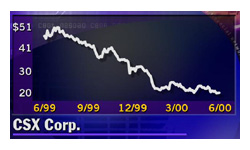|
Icahn's next target: CSX
|
 |
June 27, 2000: 7:37 p.m. ET
Financier, fresh off Nabisco profit, to buy up to 15% of railroad company
|
NEW YORK (CNNfn) - Financier and investor Carl Icahn took aim at his next corporate target Tuesday, announcing his intention to acquire up to 15 percent of the outstanding shares of struggling railroad firm CSX Corp.
Icahn, who was not immediately available for comment, disclosed his intentions in a Hart-Scott-Rodino Act filing with federal regulators. The move comes just two days after the corporate raider earned more than $600 million on his investment in Nabisco Group Holdings (NGH: Research, Estimates), which he forced onto the selling block in April when its share price floundered.
Like Nabisco, CSX (CSX: Research, Estimates) has fallen out of favor with the market. The Richmond, Va.-based railroad holding company has suffered from higher fuel and labor costs, as well as continuing congestion on its rail lines, that have substantially depressed its profit.
 CSX integrated about half of the former Conrail into its system last June, and has suffered from service problems since. Those problems were made worse by storms last fall, and by a federal safety report in March that criticized the quality of its track and ordered many of its trains to run at lower speed. The president of the company's railroad unit resigned in April. CSX integrated about half of the former Conrail into its system last June, and has suffered from service problems since. Those problems were made worse by storms last fall, and by a federal safety report in March that criticized the quality of its track and ordered many of its trains to run at lower speed. The president of the company's railroad unit resigned in April.
The company's stock price has fallen in turn. Despite climbing 11/16 to close at 20-9/16 Tuesday, CSX is more than 60 percent off its 52-week high of 51-5/8.
CSX's board reacted to Icahn's interest by amending the company's shareholders rights plan Tuesday. Under CSX's modified rights plan, designed to protect shareholders against hostile takeover tactics, a purchaser who attains a 10 percent stake would trigger the issuance of rights to existing shareholders to buy more stock in the company. The previous threshold was 20 percent.
CSX Chairman and CEO John Snow said he has met with Icahn, who gave no indication as to what his specific plans were with respect to the company. Snow said Icahn believes the company had been "undervalued by the market and was therefore a good investment."
"The CSX board gave careful consideration to a number of issues and viewpoints, including the notice from Mr. Icahn, and concluded that the amendment to the shareholders rights plan was in the best interest of CSX and its shareholders," the company said in a prepared statement.
Riding rough on the rails
CSX stock has been battered in recent years after a series of disappointing earnings and operation reports which cost Ronald Conway, president of the company's main rail unit, his job in April.
CSX and Norfolk Southern Corp. (NSC) went together on a joint purchase of Conrail, the former government-run freight railroad, in 1998, a move that consolidated rail service in the Eastern United States from three down to two carriers. Conrail was split up and integrated into the two railroads as of June 1, 1999.
Although Norfolk Southern had greater service problems immediately after the integration, it rebounded sooner and was generally credited with
being back on track by February or March of this year. But problems continued and in some cases worsened at CSX.
 A new management team has focused on improving service throughout much of the second quarter, and statistics on the railroad's operations have shown improvement in June. But financial results continue to lag, and most analyst are not expecting it to meet goals of having operating expenses of 80 percent or less of revenue until next year. A new management team has focused on improving service throughout much of the second quarter, and statistics on the railroad's operations have shown improvement in June. But financial results continue to lag, and most analyst are not expecting it to meet goals of having operating expenses of 80 percent or less of revenue until next year.
Tuesday's move took most railroad analysts by surprise, and several refused to comment on the record late Tuesday afternoon.
"I can see where he's coming from," one said, on the condition his name not be used. "It is undervalued and it's on the verge of a turnaround."
A question of timing
The timing of Icahn's SEC filing is curious, though. He submitted it June 12, and SEC regulations prevent him from purchasing shares for 30 days afterward. The day after the filing, the U.S. Court of Appeals heard a case seeking to lift a 15-month moratorium on rail mergers imposed in March by the Surface Transportation Board. A ruling is expected well before July 12.
If the court lifts the moratorium on mergers, CSX is expected to be in play from other railroads before Icahn has a chance to buy additional shares. If it does not lift the freeze, he is buying into an industry that will have few takeover opportunities for the foreseeable future.
There has been frequent acquisition activity in the railroad industry, although it has normally entailed the consolidation of major railroads.
Decades of mergers and acquisitions have left the continent with basically seven major rail carriers. Last month, two of them -- Burlington Northern Santa Fe Corp. (BNI: Research, Estimates) and Canadian National Railway (CNI: Research, Estimates) -- proposed the industry's largest merger, a move that was seen sparking the STB's moratorium.
The other railroads, including CSX, sought the moratorium, arguing the BNSF-CN deal would spark a final round of mergers before some of the other railroads are done dealing with service problems from their most recent deals. The STB basically agreed in its finding, saying it needed time to consider criteria for approving what is essentially an end game of rail deals.
Icahn has had some experience in the transportation industry, but it was not terribly positive. He bought control of Trans World Airlines in 1985, but had a rough ride with the airline, flying it into bankruptcy court protection.
In 1988 TWA stockholders approved Icahn's proposal to take the company private. The privatization took $610.3 million out of TWA -- of which $469 million went to Icahn -- and added $539.7 million to TWA's debt.
He sold many of the airline's key route authorities to London to American Airlines in 1991, then filed for bankruptcy court protection in 1992. After some further route sales during bankruptcy he relinquished control of the airline in 1993.
Icahn is not the only high profile investor looking at depressed railroad stocks. This spring, Cascade Investments, which manages the
holdings of Microsoft Chairman Bill Gates, announced it had bought a 7 percent stake in Wisconsin Central Transportation Corp. (WCLX: Research, Estimates), which operates short-line railroads that feed major railroads in North America, as well as a number of overseas rail operations. 
|
|
|
|
|
|
CSX Corp.
|
Note: Pages will open in a new browser window
External sites are not endorsed by CNNmoney
|
|
|
|
 |

|

